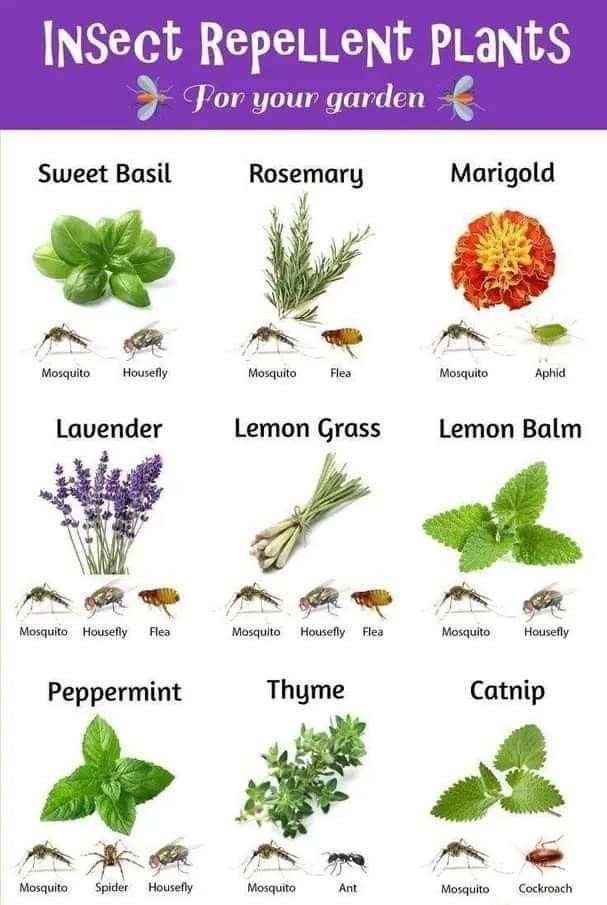Insect repellent plants are a natural and environmentally friendly way to deter insects and pests from your surroundings. They contain compounds that either repel insects or mask the scents that attract them. Here are some common insect repellent plants:
1. Citronella: Citronella is perhaps the most well-known insect repellent plant. Its strong citrus scent repels mosquitoes and other insects. You can plant citronella grass (Cymbopogon nardus) or use citronella oil extracted from the plant.
2. Lavender: Lavender not only has a pleasant fragrance but also repels mosquitoes, flies, and moths. It's a versatile plant that can be used in gardens, flower beds, or even as potted plants indoors.
3. Marigold: Marigold plants (Tagetes spp.) emit a scent that repels mosquitoes and aphids. They are often used in vegetable gardens to deter pests and attract beneficial insects.
4. Peppermint: Peppermint plants have a strong aroma that repels mosquitoes, ants, and spiders. You can plant peppermint in your garden or use its essential oil as a natural insect repellent.
5. Basil: Basil plants not only add flavor to your culinary dishes but also repel flies and mosquitoes. Planting basil in pots and placing them near doorways or windows can help keep insects away.
6. Lemon Balm: Lemon balm (Melissa officinalis) emits a lemony scent that repels mosquitoes. It's a member of the mint family and can be grown in pots or in garden beds.
7. Rosemary: Rosemary is a versatile herb with a strong aroma that repels mosquitoes and other insects. Planting rosemary in your garden or using its essential oil can help keep pests at bay.
8. Catnip: Catnip (Nepeta cataria) is well-known for its effect on cats but also acts as a natural insect repellent. It can repel mosquitoes, flies, and cockroaches. However, keep in mind that planting catnip may attract neighborhood cats.
9. Eucalyptus: Eucalyptus trees and shrubs contain compounds


The Quran makes multiple references to gardens, highlighting their spiritual significance. It describes gardens in Paradise as a place of eternal joy, abundance and peace. In this world too, gardens symbolized luxury, prosperity and comfort for Arabs in the harsh desert climate.
The Quran mentions vineyards and date-palms when referring to worldly gardens. It notes how Allah provides fruits like grapes, dates and various crops through rainfall and springs. Vegetables like cucumbers, garlic and lentils are also mentioned - a reminder of humanity's dependence on nature's bounties.
Flowing waters are a recurring motif. Rivers, springs and streams symbolized refreshment and sustenance. The greenery and shade of trees added to gardens' allure. Two special gardens granted to Saba further underscored Allah's blessings if people give thanks.
Paradise is portrayed with imagery familiar yet far exceeding this world's beauty. Its residents relax by rivers under shady trees heavy with fruits. All desires are fulfilled through bounties not requiring toil. Comfort surrounds those reclining with loved ones on soft couches facing one another.
Allah promises to admit believers into eternal gardens with flowing rivers, where they will dwell securely in perfect joy. The vivid descriptions utilizing nature's splendor aim to evoke appreciation for creation's signs while reassuring believers of salvation through righteous deeds. Truly, the Quran's spiritual lessons encompass this life and the next through its profound wisdom.
The Quran makes various references to trees and forests, recognizing their importance. It mentions how Allah sends down rain from the sky, which helps trees, plants and crops to grow benefiting both animals and humans. Forests play a key role in maintaining ecological balance and climate stability.
The Quran highlights how certain trees like palm trees bear dates in beautiful clusters, while olives produce oil. Forests are habitats for diverse life forms. Bees are instructed to build dwellings in mountains and trees. The Prophet Yusuf took refuge under a tree when he was betrayed. Prophet Musa's staff, which was also a source of guidance, came from a tree.
Forests regulate weather patterns, absorb carbon dioxide, generate oxygen and prevent soil erosion. Plant leaves with their structure, color and odor fulfil ecological roles. Photosynthesis is a great sign embodying Allah's power. Everything in creation has a purpose reflecting the Lord's endless wisdom.
The Quran invites us to reflect on subtleties in nature like plant growth from seeds. Forests glorify the Creator through their grandeur. While enjoying forests' resources, we must protect them for future generations according to the principles of sustainability, justice and trust. Overall, the Quran's references highlight mankind's responsibility as stewards entrusted over the earth.










